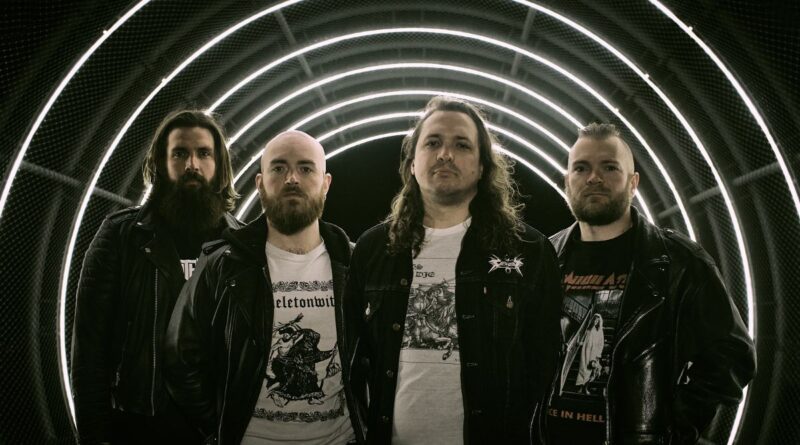INTRODUCING: Terminalist
Thrash is dead – at least, so say the naysayers who are convinced nothing of worth has been produced since its heyday in the mid 80s. Evidently, Danish-American outfit TERMINALIST didn’t get that memo. Balancing the blackened ferocity of SKELETONWITCH with technical thrash straight out of the 1980s but updated for modern times, they bring a blackened thrashing assault with a penchant for philosophising, science fiction, proggy moments and what they’ve termed ‘hyperthrash’. We caught up with guitarist Emil Hansen to talk about the beginning of the band, French philosophy and the end of the world.
“Frederik [Amris, drummer] and I were roommates for some years but it’s a little weird in that sense. We hadn’t ever truly been active in bands [together] but we were good friends. When we lived together, the idea came up along the way that we should play a little bit, try it out,” he explains when we ask how the band got their start. Somewhat at odds with their themes of speed, It took the band a little while to get going. “It did take a little bit until we got a third member. [Morten Bruun] who also plays guitar, then we had a really hard time getting a bass player. So we started writing a lot of material, recording in our little rehearsal space and released an EP.” That EP was 2019’s Abandon All Liberties, that showcased the band’s penchant for blackened thrash.
Since then, the band has shifted lineup slightly – their original bassist had to move as he was from Germany and they welcomed in Kalle Tiihonen from Texas. Of the change, Emil remarks, “that’s why we’re a Danish-American band. Our new bass player is from Texas originally, though he has a Finnish name so it can look a little confusing when you look at the names!” Somewhat more straightforward is their name – though that too is packed with meaning. “We had a hard time coming up with a name!” Emil exclaims when asked about the meaning behind TERMINALIST. “You usually do, when you’re new and you have to find a definition of your sound and your whole concept and package in a word, maybe three. I think TERMINALIST works pretty well – it sounds kind of, it gets, it sounds like a metal band. But it also says, it also ties in with the overall concept of the band.”
That concept is – quite simply – speed. More specifically, debut The Great Acceleration, and their music generally, is based on the work of the French philosopher Paul Virilio and his concept of dromology. “Dromology basically revolves around themes of speed, acceleration and how speed always increases and makes our societies in general and our technological processes faster and faster”; but it wouldn’t quite be thrash without some political or social commentary thrown in – as expounded on by the eleven minute epic The Invention Of The Shipwreck. As Emil explains, this was a conscious choice for the length as well as to dig further into themes of the duality of technology.
“That’s a direct quote from Paul Virilio himself… saying that the invention of the plane was the invention of the plane crash and the invention of the train was also the invention of the train crash. That is quite pessimistic you could say, but it’s also quite realistic. It makes perfect sense that the more you invent, the more you potentially also destroy.” To both TERMINALIST and Paul Virilio, the idea is that the pace of technology is constantly accelerating and we must always be aware that this constant speeding up of progression comes with more potential for disaster.
The album’s themes of a collapsing planet while humanity desperately races to colonise the stars are very timely. The world is grappling with multiple crises, from the current economic crisis and the devastating impacts and implications of climate change. This is something TERMINALIST are hyper-aware of – “all these different horizons of doom, if you put it pessimistically!” As Emil describes. But there’s also, as both the record and current news alludes to, moments of progress from the Perseverance rover on Mars to Elon Musk and Jeff Bezos’ missions to get humanity back to space. “It’s very present, the themes that we deal with!” he exclaims. This duality of progress balanced with its associated risks isn’t to say we shouldn’t progress – as Emil explains. “If you only view the bright, the good side of technological innovation and never reflect on what kind of destruction it could bring, you essentially reduce the process to propaganda.” Innovation isn’t the bad guy – we just must always be aware of what we’re doing in service of progress. A timely message – and one we should all heed.
The Great Acceleration is out now via Indisciplinarian. Check out our feature with the band in our latest issue of Distorted Sound New Blood via our Patreon Page!
Like TERMINALIST on Facebook.

